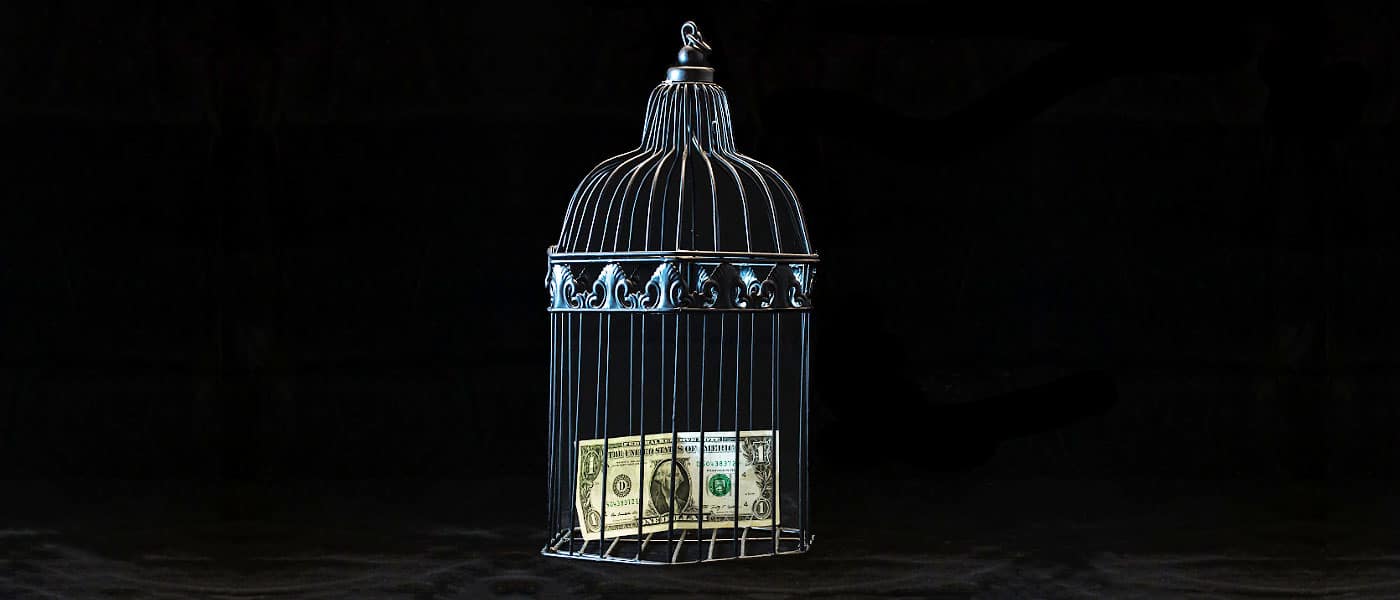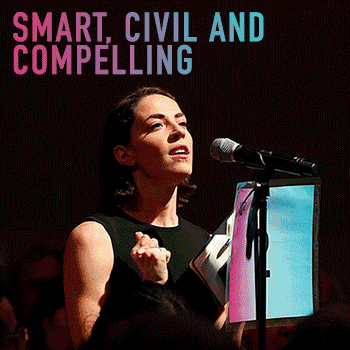Drawing a line on corruption: Operation eclipse submission

Drawing a line on corruption: Operation eclipse submission
Opinion + AnalysisBusiness + LeadershipPolitics + Human RightsSociety + Culture
BY The Ethics Centre 6 AUG 2019
The Ethics Centre (TEC) has made a submission to the NSW Independent Commission Against Corruption (ICAC) regarding its discussion paper, The Regulation of Lobbying, Access and Influence in NSW: A Chance To Have Your Say.
Released in April 2019 as part of Operation Eclipse, it’s public review into how lobbying activities in NSW should be regulated.
As a result of the submission TEC Executive Director, Dr Simon Longstaff has been invited to bear witness at the inquiry, which will also consider the need to rebuild public trust in government institutions and parliamentarians.
Our submission acknowledged the decline in trust in government as part of a broader crisis experienced across our institutional landscape – including the private sector, the media and the NGO sector. It is TEC’s view that the time has come to take deliberate and comprehensive action to restore the ethical infrastructure of society.
We support the principles being applied to the regulation of lobbying: transparency, integrity, fairness and freedom.
Key points within The Ethics Centres submission include:
-
- There is a difference between making representations to government on one’s own behalf and the practice of paying another person or party with informal government connections to advocate to government. TEC views the latter to be ‘lobbying’
-
- Lobbying has the potential to allow the government to be influenced more by wealthier parties, and interfere with the duty of officials and parliamentarians to act in the public interest
-
- No amount of compliance requirements can compensate for a poor decision making culture or an inability of officials, at any level, to make ethical decisions. While an awareness and understanding of an official’s obligations is necessary, it is not sufficient. There is a need to build their capacity to make ethical decisions and support an ethical decision making culture.
You can read the full submission here.
Update
Dr Simon Longstaff, Executive Director at The Ethics Centre, presented as a witness to the Commission on Monday 5 August. You can read the public transcript on the ICAC website here.
MOST POPULAR
ArticleHEALTH + WELLBEING
Maggie Beer: Good food can drive better aged care
ArticleHEALTH + WELLBEING
Parent planning – we should be allowed to choose our children’s sex
BY The Ethics Centre
The Ethics Centre is a not-for-profit organisation developing innovative programs, services and experiences, designed to bring ethics to the centre of professional and personal life.
Shadow values: What really lies beneath?

Shadow values: What really lies beneath?
Opinion + AnalysisBusiness + Leadership
BY John Neil The Ethics Centre 6 JUL 2019
Respect, integrity, communication, and excellence. They’re admirable and worthy corporate values – ones you’d proudly make official and put on the wall.
Unfortunately, those same values belonged to Enron. Only 12 months before declaring bankruptcy in 2001, the largest in US history at the time, Enron received plaudits for its 64 page Code of Ethics. It was named “America’s Most Innovative Company” by Fortune magazine and received numerous awards for corporate citizenship and environmental policies.
Enron’s failings have been well documented as the prototypical case study of what can happen when an organisation decouples its official values, principles and purpose – what we call an Ethics Framework – from its everyday behaviours.
It’s a perennial challenge for all organisations. Ensuring behaviour, policies, systems and processes are aligned with that ethical framework is no easy feat. If the managers of an organisation say one thing but consistently do something else entirely, it breeds cynicism and disconnection that permeates the entire workforce. Customers and other stakeholders eventually figure it out as well.
Hidden from view
Many organisations have a second set of values lurking beneath the surface. These unofficial values – no less powerful than the official ones – are called ‘shadow values’.
Uncovering shadow values can reveal deeper facets of an organisation’s actual operating culture. By proactively identifying and monitoring its shadow values, an organisation is better placed to see any early drift in the alignment of its culture from its values and principles.
Consider the fraudulent behaviour of Volkswagen engineers who deliberately programmed 500,000 diesel-powered vehicles to provide false readings during emissions testing. Despite the company’s explicit corporate values of excellence, professionalism and a commitment to integrity, it became clear through the accounts of investigators and employees, that a number of unofficial shadow values were dominating the organisation’s culture.
Volkswagen’s official and shadow values
In psychology, the dark side of human nature is often described as the alter ego. While Freud referred to the Id, Jung identified it as the shadow, referring to the sum total of all those unpleasant qualities we prefer to hide. The shadow gains its power through being habitually repressed. And it manifests in a multitude of symptoms and psychological disturbances.
Similarly, an organisation’s shadow values gain their power from being kept below the surface. At their worst, they are destructive mutations of the official values which pose an existential threat to the integrity of an organisation’s ethical culture.
Despite the official values of ‘teamwork’ and ‘respect for individuals’, Volkswagen’s implicit leadership model was widely recognised as one that valued ‘autocracy’ and delivering ‘success’ at any cost.
A focus on fear
A culture of ‘fear’ was common, with intimidation used as a primary motivator for achieving sales targets. Fear provided a bulwark against any dissenting voice being raised to challenge decisions. These voices were kept silent by a culture that fostered ‘internal competition’ and ‘secrecy’.
Shadow values can also throw into relief sanctioned organisational values, revealing subtle nuances in the way they are understood and practiced day to day. For Volkswagen, its stated value of ‘excellence’ was subsequently revealed to be a very specific type of value – ‘technical excellence’.
The value of technical excellence has been evident throughout the company’s history. Volkswagon turned to it in that 2015 scandal, just as it did in the 1970s when it was found guilty of similar manipulative practices to avoid emissions regulations.
These shadow values had their genesis in the shift in VW’s purpose. Following the appointment of Martin Winterkorn as CEO in 2007, Volkswagen set itself a goal: “To become the world’s largest automaker by 2018”. Winterkorn’s strategy was premised on developing a competitive advantage in ‘clean’ diesel rather than hybrids and other alternatives.
A shift in purpose
With tighter regulatory controls in the US, intense pressure was focussed on engineers to develop a technical solution, which they duly delivered, under the authority of the shadow values. In secretly modifying existing software capabilities that overrode pollution controls, Volkswagen went on to sell over 12 million illegal vehicles and met the target of becoming the “world’s largest automaker”, three years ahead of schedule.
This shift in purpose was not recognised formally in the company’s ethical framework. Allowing shadow values to proliferate unmoored the company from its purpose, values and principles. Indeed many of those shadow values were officially discouraged by VW’s ethical framework.
After his appointment in June 2017, new CEO Matthias Müller noted, “Our management culture needs to improve… openness, the courage to make innovations and speak one’s mind, as well as true willingness to cooperate are all essential elements… We need a solid system of values as a compass for our daily work.”
One hopes this “solid system of values” will be more attuned to the ones that might be still operating in the shadows.
At their worst, shadow values are in complete opposition to official values. At their best, they provide a nuanced expression of what an organisation really cares about. Either way, they are very revealing of an organisation’s true, operating culture.
The Ethics Centre is a world leader in assessing cultural health and building the leadership capability to make good ethical decisions in complexity. To arrange a confidential conversation contact the team at consulting@ethics.org.au. Visit our consulting page to learn more.
Ethics in your inbox.
Get the latest inspiration, intelligence, events & more.
By signing up you agree to our privacy policy
You might be interested in…
Opinion + Analysis
Business + Leadership, Society + Culture
A new guide for SME’s to connect with purpose
Opinion + Analysis
Business + Leadership
How a Shadow Values Review can improve your organisation
Opinion + Analysis
Business + Leadership, Science + Technology
Big tech knows too much about us. Here’s why Australia is in the perfect position to change that
Opinion + Analysis
Business + Leadership
The invisible middle: why middle managers aren’t represented
BY John Neil
As Director of Education and Innovation at The Ethics Centre, John collaborates closely with a talented team of specialists and subject matter experts to shape the tools, frameworks, and programs that drive our work forward. He brings a rich and varied background as a consultant, lecturer, and researcher, with expertise spanning ethics, cultural studies, sustainability, and innovation. This multidisciplinary perspective allows him to introduce fresh, thought-provoking approaches that energise and inspire our initiatives. John has partnered with some of Australia’s largest organisations across diverse industries, to place ethics at the heart of organisational life. His work focuses on education, cultural alignment, and leadership development to foster meaningful and lasting impact.
BY The Ethics Centre
The Ethics Centre is a not-for-profit organisation developing innovative programs, services and experiences, designed to bring ethics to the centre of professional and personal life.
The dark side of the Australian workplace

The dark side of the Australian workplace
Opinion + AnalysisBusiness + Leadership
BY The Ethics Centre 5 JUN 2019
The founder of a law firm recently explained long working days under high pressure at his firm, saying: “People come here with the knowledge and expectation that they’re going to have to work hard”.
He could have been speaking for any number of employers in high-stress industries.
As young graduates leave university to work in top-tier law firms, in hospitals, merchant banks and professional services, they are already well acquainted with hard work and competition. They have strived to become the best and brightest through many years of education, often polishing their resumes with extra-curricular achievements in sport, music and volunteer work – all the while supporting themselves with part-time jobs.
These young people know what it is like to “burn the candle at both ends”, to run themselves ragged getting ahead of the competition so they can get one of the prized entry-level jobs that may lead to continued success.
They expect to be worked hard. They probably don’t expect to be worked to death.
Two leading law firms have recently been investigated over complaints about “extreme working conditions”, where one solicitor warned that it had reached a “point someone will die or have some other physical or mental health episode’’.
An unprecedented move by WorkSafe
In one well-publicised example, WorkSafe Victoria had launched an investigation into King & Wood Mallesons in Melbourne after a similar complaint regarding overwork and exhaustion, particularly during the Banking and Finance Royal Commission.
King & Wood Mallesons chief executive partner, Berkeley Cox, says the legal industry is paying much closer attention to the issue of work stress.
“We have learnt so much over the past year and recognise that there is a lot more that law firms can and should be doing to improve the everyday work experience for individuals and the systematic issues at an organisational and industry-wide level,” he says.
“While we have much more to do on our journey, we want our workplace to be one where every individual has the opportunity to flourish.”
WorkSafe’s action is regarded as unprecedented in the legal industry and some pundits have nominated it as a “death knell” for the concept of the “billable hour” – whereby firms charge clients for each hour their lawyers work.
The billable hours system means that workers are incentivised to work longer, rather than smarter.
Certainly, the statistics around mental health in the legal profession are alarming.
Around 50 per cent of law students, 33 per cent of solicitors and 20 per cent of barristers report they have experienced depression. Further, 11 per cent of lawyers contemplate suicide each month, according to research published on the website of legal mental health charity, Minds Count (formerly the Tristan Jepson Memorial Foundation).
A punishing rite of passage
Investigating the causes of this crisis and exploring possible solutions usually leads back to an industry culture of being always-available to clients, unreasonable demands for fast turnarounds and the “billable hour”. There is also a long-held belief in the professions that young people will work punishing hours as a “rite of passage” that will pay off in the long run.
In the legal industry, Royal Commissions tend to amp up the pressure, with work going on in 24-hour cycles in 15-hour shifts, seven days per week, in an environment that is intolerant of mistakes or human frailties.
As it is, lawyers work longer overtime than professionals in any other field in Australia, according to a position paper by The Legal Forecast, a not-for-profit group that provides support for students and early-career lawyers.
Under discussion at a recent event, hosted by The Legal Forecast, was the exacting timetabling of the Hayne Royal Commission and the impact it had on lawyers, particularly junior staff.
DLA Piper Australia co-managing partner and Minds Count board member, Melinda Upton, asked: “Was it worth the sacrifice when you look at statistics on people committing suicide and entering depression? Did it have to be done that quickly?”.
This point was picked up by Scarlet Reid, a partner at McCullough Robertson Lawyers, who said she worked on the Hayne Royal Commission and is now working on this year’s Aged Care Royal Commission.
Reid said the Aged Care commission was proceeding at a “much slower pace” and questioned whether the banking Royal Commission really had to be completed in one year.
“Politics drives that as well,” she said. “We could slow down.”
She said many of the organisations involved in giving evidence to the Aged Care Royal Commission were not-for-profits that did not have the funds to pay for large legal teams – a factor that puts a brake on the pace.
Need to slow down
Partner at legal recruitment firm ECP Legal, Justin Whealing, said a senior banking corporate counsel told him he wished the law firms and their clients had teamed up to ask the commissioner for more time.
“I think the legal profession could do that better, in terms of presenting a united front to speak in one voice about how meaningful changes can be made for the betterment of the profession. Clients would get better advice as well and it would be more sustainable for the people in it,” Whealing said. He also advocated having an industry-wide standard, setting out conditions such as maximum work hours and mandatory breaks and using targets.
Reid acknowledged the bind that law firms find themselves in: “It’s very difficult when you’ve got clients needing to meet deadlines, getting into witness boxes. And, you know, it’s a balance”.
Some firms are using contract lawyers to help manage workload over peak times, says the head of Innovation and Project Delivery at Pinsent Masons, Alison Laird. Even without being involved in a Royal Commission, there are huge deadlines that must be met. “So we ramp up the team, and then we ramp them down again,” she says.
Getting rid of ‘billable hours’
Laird said things will not improve until law firms change the way they remunerate their people and get rid of the “billable hour” system, which drives lawyers to bill a certain number of hours per year to the detriment of their mental wellbeing. “It is the one thing that impacts innovation more than anything else,” she says.
At least one top tier firm, Corrs Chambers Westgarth, is dumping the billable hour concept (while adding an extra week of annual leave) and replacing them with annual billing targets, which allow for peaks and troughs of client-billed activity.
However, Melinda Upton warned that replacing the billable hours system cannot happen without the support of clients, who are likely to push back on any change. Member of The Legal Forecast NSW, Edwin Montoya Zorrilla, supports a move away from billable hours and offers more remedies: the automation of various legal tasks and integrating long-term thinking into practice management and recruitment.
“This discussion also includes more specific strategies such as optimising systems of delegation and work sharing, better communication with clients, and using technology-assisted project management tools,” he writes in an article for Westlaw.
“Yet, none of these strategies, however innovative, take effect overnight, and there remains a tendency to return to traditional means of meeting the bottom line.”
Encourage safe work
Upton said it is a responsibility of law firm partners and management to educate the partners about staff wellbeing and “to call it out when they don’t come to the table on it”.
They can also highlight examples where enforcing or encouraging safe work practices has worked well.
“Usually it means your attrition rates have improved, you’ve got a much happier team, you’ve got succession and talent mapping and progression going on, you get good client feedback. And clients really don’t care where you work.”
Reid says working shorter hours may mean that law partners have to accept they will make less money.
When partners discuss remuneration structures at a firm-wide level, they need to be talking about encouraging the sharing of work between teams, the use of contract lawyers and other ways to create a sustainable work environment.
“There is an element of almost a corporate greed associated with the driving of long hours … unless you’re going to change the remuneration structure, then it’s going to be hard to drive behaviour,” she says.
This article was originally written for The Ethics Alliance. The Alliance is a community of organisations sharing insights and learning together, to find a better way of doing business.

This article was originally written for The Ethics Alliance. Find out more about this corporate membership program. Already a member? Log in to the membership portal for more content and tools here.
Ethics in your inbox.
Get the latest inspiration, intelligence, events & more.
By signing up you agree to our privacy policy
You might be interested in…
Opinion + Analysis
Business + Leadership, Health + Wellbeing, Society + Culture
Corruption in sport: From the playing field to the field of ethics
Opinion + Analysis
Business + Leadership, Health + Wellbeing
David Pocock’s rugby prowess and social activism is born of virtue
Opinion + Analysis
Business + Leadership
The Royal Commission has forced us to ask, what is business good for?
Opinion + Analysis
Business + Leadership, Relationships
Corporate whistleblowing: Balancing moral courage with moral responsibility
BY The Ethics Centre
The Ethics Centre is a not-for-profit organisation developing innovative programs, services and experiences, designed to bring ethics to the centre of professional and personal life.
Why the future is workless

Predictions for the future of work are grim – depending on your point of view. Many of our jobs are being automated out of existence, but it looks like we’ll have much more free time.
Writer and Doctor of Philosophy, Tim Dunlop, says people and governments are going to have to rethink how we support ourselves when there isn’t enough paid work to go around.
Dunlop does not ascribe to the view often put forward by economists that technology will generate enough jobs to replace the ones that are destroyed by robotics and artificial intelligence.
“I don’t know if that’s necessarily true in the medium term… I think there’s going to be a really nasty transition for more than a generation,” says Dunlop, the author of Why the Future is Workless and The Future of Everything.
“We are going through this huge period of transition at the moment and we don’t really know where it’s heading. We’re at the bottom of the curve, in terms of what [new technologies] are going to be capable of.”
Dunlop says framing question around the future of work as “will a robot take my job?”, is reductive. Instead, we should be looking at what sort of job will be available and what the conditions will be for the jobs that are offered.
“If we are working less hours, or there is less work, or the economy just needs fewer people, and then we don’t have a technology problem, we’ve got a distribution problem,” he says.
The “hollowing out” of the job market means that middle-skilled jobs are disappearing because they can be automated. Trying to “upskill” people who have been displaced, or redirect them into jobs that need a human touch (such as caring jobs) is not an answer for everyone.
“Not everybody can have a high-skill, high-paid sort of job. You need those middle-level jobs as well. And if you don’t have those, then society’s got a problem.” he says.
Dunlop says one way of addressing the issue is a universal basic income: where everybody gets a standard payment to cover their basic needs.
“I don’t think you can rely on wages to distribute wealth in an equitable way, in the way that might have been in the recent past,” he says.
The idea of a Universal Basic Income has been around since the 16th Century and is unconditional – not based on household income.
In Australia, the single-person pension (now just over $24,000 per annum) might be seen as an appropriate level of payment, according to Dunlop, in an article written for the Inside Story website.
“It is basic also in the sense that it provides an income floor below which no one can fall. The payment is unconditional in that no one has to fulfil any obligations in order to receive it, and even if you earn other income you’re still eligible. That makes it universal, equally available to the poorest member of society as it is to the start-up billionaire,” he writes.
Much of the discomfort often voiced about such a scheme centres around the idea that people are being paid to “do nothing” and that it removes the incentive to work.
However, trials show that in developing countries, people use the money to improve their situation, starting businesses, sending children to school and avoiding prostitution. In Europe and Canada, people receiving the payment tend to stay in their jobs and entrepreneurship increases.
Trials of the Universal Basic Income are now taking place globally – from Switzerland to Canada to Kenya – but most are limited to the unemployed or financially needy, rather than being universal.
Dunlop says that, rather than worrying about whether people “deserve” the payment, we should accept the concept of “shared citizenship”. Whether we do paid work, or not, we are all contributing to the overall wealth of society.
Inequality comes when wealth gets divided up by those who do work that is paid and those who own the means of production. With a Universal Basic Income, everybody’s contribution is valued and people get a benefit from the roles they play in the formal and informal economy, he says.
So what will we be doing in the future if we are not doing paid work? Dunlop says we will still have our hobbies, passions and families – and we can derive just as much (if not more) meaning from those things as we do from our jobs.
We are already seeing evidence of efforts to reduce the hours of work, with companies trying four-day work weeks (paid for five), the Swedish Government trialling a six-hour workday, a French law banning work emails after hours.
Dunlop says a “work ethic” culture makes it hard for these reforms to succeed and unions tend to see a push for reduced hours as a “trojan horse” threat of increasing casualisation and insecure work.
“That’s where things like the French rule about emails probably comes in handy. It sets some parameters around what society sees as acceptable and maybe it needs some government leadership in this area.”

This article was originally written for The Ethics Alliance. Find out more about this corporate membership program. Already a member? Log in to the membership portal for more content and tools here.
Ethics in your inbox.
Get the latest inspiration, intelligence, events & more.
By signing up you agree to our privacy policy
You might be interested in…
Opinion + Analysis
Business + Leadership
Why purpose, values, principles matter
Opinion + Analysis
Society + Culture, Business + Leadership
How to tackle the ethical crisis in the arts
Opinion + Analysis
Business + Leadership, Science + Technology
Blockchain: Some ethical considerations
Opinion + Analysis
Business + Leadership
Let the sunshine in: The pitfalls of radical transparency
BY The Ethics Centre
The Ethics Centre is a not-for-profit organisation developing innovative programs, services and experiences, designed to bring ethics to the centre of professional and personal life.
Can you incentivise ethical behaviour?

Can you incentivise ethical behaviour?
Opinion + AnalysisBusiness + LeadershipRelationships
BY Fiona Smith 31 MAY 2019
In the wake of the Financial Services Royal Commission, many employers are asking whether they should award bonuses to people who choose to do the right thing.
Boards and CEOs are discussing whether people need an incentive to make ethical decisions and how “ethical incentives” could avoid the risk of encouraging unintended behaviours.
Incentives have a tarnished reputation, with poorly-constructed programs blamed for driving a culture of greed in banks and insurance companies. The international anti-corruption organisation, Transparency International, says performance incentives should not just focus on getting sales, for instance, but also consider how those sales are achieved.
“ … incentive schemes should move beyond mere alignment with values and ethical codes and actively encourage ethical behaviour,” according to the authors of Transparency International’s 2015 report Incentivising Ethics: Managing incentives to encourage good and deter bad behaviour.
“This means that they should not be based solely on financial targets, but should contain non-financial targets that reflect and drive ethical behaviour. Ultimately, this mix of incentives should support the long-term sustainability and success of the company.”
Senior principal advisory at research company Gartner, Arj Bagga, says the Royal Commission has sparked many conversations with his clients, who want to know if they can use ethical behaviour as a measure in the “performance systems” they use to encourage the best work from their people.
A limit on rewards?
Bagga says they can – but within limits. Financial rewards or goods (such as restaurant vouchers) are only effective up to the value of $300, he says.
“Anything over $300 has an incrementally lower benefit on employee performance.”
The reason for this is that financial rewards are an “extrinsic” motivator, meaning that it comes from outside the person, and are much less effective than an “intrinsic” motivator (an inner desire).
“After $300, it starts to extrinsically motivate them too much, whereby they just associate ethical behaviour with financial reward, which is not what you want,” says Bagga.
“You actually want them to be intrinsically-motivated, because, if you remove the reward down the line, because of cost cutting or whatever it might be, employees will then stop acting ethically, just because they’re not being rewarded.
“What we want to do is have a balance between the intrinsic and extrinsic motivation.”
Recognition vs cold hard cash
The most intrinsic powerful motivator is recognition – commending people for their ethical behaviour. Such public recognition can increase employee performance by up to 3 per cent, he says.
However, the effect of that recognition can be supercharged by attaching a financial reward “which we found can increase performance by a further 5 per cent”.
While research has shown that the effectiveness of financial rewards can quickly fade, Bagga says the impact of the small reward can be sustained by using ethical behaviour as a measure in performance reviews.
Because their promotions depend on it, people will continue to try to display the desired behaviours, he says.
Making the right choice
A further question is how to identify ethical behaviour, when it is essentially just doing what would be expected of a decent person. Bagga says managers can reward those instances where people make ethical choices in situations where there is no clear answer.
This could be when, for instance, a salesperson sells a product that earns a lower commission, or no commission, but is a better choice for the customer.
Transparency International, while supporting the use of incentives, points out some of the risks around trying to identify and reward ethical behaviour: the measures are subjective, corrupt employees may be convincing actors, not all ethical acts will be recognised which could cause resentment, and discussion about behaviours may lead to some difficult performance review discussions.
Bagga says ethical behaviour is a good business strategy. If organisations can ensure their people recognise what ethical behaviour is, adopt an ethical mindset and then act upon it, they can increase employee performance by up to 12 percent, he says.
Short term pain, long term gain
Some employers may not be sympathetic to the idea their people forego revenue as they look for the best option for customers. However, Bagga says that view would be myopic.
“It may impact you in the very short term but, longer term, it will actually increase your brand awareness in the marketplace and it will increase your ability to attract talent,” he says.
“In Australia, specifically, ethical behaviour is one of the core reasons a person chooses to join an organisation.”
Australian survey respondents rank “ethics” and “respect for the organisation” higher than manager quality and future career opportunity when they are assessing career paths.
Bagga says that it is not just the financial services companies that are interested in the idea of “incentivising” ethical behaviour.
“I’ve also had conversations with mining companies and telecommunications companies, who are trying to get on the front foot of this and make sure they are bullet proofing themselves against any unethical behaviour that could occur in their organisations because they understand, through the Royal Commission, what the implications of those could be on the performance of their business and the perception of their brand.”
Cashless recognition
- Introducing ethics and values measures into performance reviews
- Good ethical conduct being a prerequisite for promotion.
- Spot awards for good ethical practice, recognising special contributions as they occur, usually over a relatively short-term period.
- Awards for people who speak up or challenge questionable conduct.
- Recognition and/or prizes for people who excel in ethics and compliance training.
- Recognition for outstanding contribution to the ethics and compliance programme.
- A company-wide ethics award scheme.
- Coverage of examples of good ethical or anti-corruption practice in the company newsletter.
- Thank you letters from the CEO or senior managers for people who display ethical behaviour.
- Dinner with the CEO as a prize for people who demonstrate ethical behaviour.
Source: Transparency International
This article was originally written for The Ethics Alliance. The Alliance is a community of organisations sharing insights and learning together, to find a better way of doing business.

This article was originally written for The Ethics Alliance. Find out more about this corporate membership program. Already a member? Log in to the membership portal for more content and tools here.
Ethics in your inbox.
Get the latest inspiration, intelligence, events & more.
By signing up you agree to our privacy policy
You might be interested in…
Opinion + Analysis
Business + Leadership
BFSO Young Ambassadors: Investing in our future leaders
Opinion + Analysis
Health + Wellbeing, Relationships
Five stories to read to your kids this Christmas
Opinion + Analysis
Business + Leadership
Who are corporations willing to sacrifice in order to retain their reputation?
Opinion + Analysis
Relationships, Society + Culture
Bring back the anti-hero: The strange case of depiction and endorsement
BY Fiona Smith
Fiona Smith is a freelance journalist who writes about people, workplaces and social equity. Follow her on Twitter @fionaatwork
The transformative power of praise

The transformative power of praise
Opinion + AnalysisBusiness + LeadershipRelationships
BY Professor Bob Murray 11 MAY 2019
What is it about the legal industry that makes it so depressing? Well, it is not the work – but it could be exhaustion mixed with a lack of control about how much work they can handle and a shortage of appreciation from their bosses.
Psychologist and a scientist in behavioural neurogenetics, Bob Murray, says human beings are designed to work as little as 10 hours per week.
“If we work for more than 10 hours a week, it becomes stress,” he told a recent seminar in Sydney.
While that may seem an extreme position at first glance, it is important to understand what Professor Murray means by “work”.
“Work” is the stuff we do that is a grind. It is, perhaps, the administrative work that takes us away from the tasks that are meaningful or enjoyable.
“Work means not necessarily enjoying yourself, not necessarily relating. Human beings are relationship-forming animals. We are driven to surround ourselves with a network of supportive relationships and we can work hard and long… providing that we do it in the company of other people that we actually like, and that we enjoy the process of doing things with them.
“It’s not a question of how many hours you work. It’s whether you enjoy the process of doing that work. And whether you enjoy the people that you do it with”.
Murray said people come to work to be part of a tribe and to learn.
“So people in law firms are willing to stay there for long hours, providing they’re enjoying the process of learning what they’re doing,” he said.
Murray says 30 percent of all lawyers think about suicide once a year and 40 percent are clinically depressed.
A national survey of almost 1000 lawyers finds that excessive job demands, minimal control over workload and spillover of work commitments into personal life are some of the work-related factors correlated with poorer mental health outcomes.
“Concerns about the structure and culture of legal practice in Australia are also highlighted,” say the authors of the study, Lawyering Stress and Work Culture: An Australian Study, 2012-2013.
He says one relatively simple thing that employers and managers can do is to praise their people. However, only around 5 percent of people get praised once a day.
Praise is powerful because of its effect on the “feel good” chemicals we produce, like dopamine, which helps our brains work faster, smarter, and more creatively.
However, poorly given praise tends to antagonise people. Murray says there are three elements to effective praise:
What: The giver has to be specific about what they are praising. A generic “well-done team” can have the opposite effect.
How: This is the effort or the way someone has gone about something. It is the kind of praise you may give a child who comes last in a race, but stuck it out to the end, gave it their best effort and didn’t let the team down. It is not necessarily tied to success, but encourages and rewards the right behaviours.
Who: This is praise for the relationship. “ I really enjoy working with you. It’s great to have you as part of you of my team.” Murray says this kind of praise is less used in law firms than other kinds – but is the most powerful.

This article was originally written for The Ethics Alliance. Find out more about this corporate membership program. Already a member? Log in to the membership portal for more content and tools here.
Ethics in your inbox.
Get the latest inspiration, intelligence, events & more.
By signing up you agree to our privacy policy
You might be interested in…
Opinion + Analysis
Relationships
5 stars: The age of surveillance and scrutiny
Opinion + Analysis
Politics + Human Rights, Relationships
Want #MeToo to serve justice? Use it responsibly.
Explainer
Relationships
Ethics explainer: Nihilism
Opinion + Analysis
Business + Leadership, Relationships
Treating citizens as customers is a recipe for distrust
BY Professor Bob Murray
Professor Bob Murray, is a principal at consultancy Fortinberry Murray, was speaking on a panel, hosted by The Legal Forecast and Clarence Workplaces for Lawyers in Sydney.
Corruption, decency and probity advice

Corruption, decency and probity advice
Opinion + AnalysisBusiness + LeadershipPolitics + Human RightsSociety + Culture
BY David Burfoot 6 MAY 2019
Corruption and probity are hot topics in Australia’s public sector. Even a cursory glance at recent cases brought before corruption watchdogs shows this.
The long running stories and court cases that follow have become a staple of national news bulletins. Any time a state asset is built, sold or disposed of, there are serious questions to be asked.
Probity – which is a corporate noun for ethics or honesty and decency – has established its place in the architecture of technical services that assess, assure and measure high-risk public sector projects. Probity advising and auditing is crucial when how a project is executed is just as important as any intended outcome.
As the line separating public and private sector accountabilities becomes less clear, non-government actors are increasingly looking to probity professionals to help ensure – and show – integrity in their dealings. However, before doing so it is important the probity professionals themselves improve the integrity of their process and gain a more sophisticated understanding of ethical frameworks.
Probity services are provided both by large accounting firms and a growing band of smaller boutique operators. Probity plans (documents that set out how the project will be run to ensure the integrity of the process) are now a mandatory requirement for many public projects.
Probity professionals use a number of lenses to monitor and promote ethical decision making in execution, typically through the following fundamentals:
Value for money: Was the market tested adequately to ensure an organisation was achieving the most competitive result, which made the best use of resources?
Conflicts of interest and impartiality: Were processes in place to manage any actual, perceived or potential conflicts of interests?
Accountability and transparency: Was an auditable trail maintained to provide evidence of the integrity of the process? Was enough information made available to promote confidence – for example, were selection criteria and time lines for decision making adequately communicated?
Confidentiality: When sensitive information from stakeholders is received, such as private or business-in-confidence information, was there a process in place to identify and protect this information?
The growth of probity services over the last 30 years undoubtedly reflects their ability to add value to projects. However, over that same period there has been concern that practitioners have at times diminished, rather than promoted, probity fundamentals. Some of the critical factors include:
- Relying too heavily on compliance monitoring at the expense of ethical considerations
- Allowing their duties to be too narrowly defined by clients
- Lacking the confidence to challenge impropriety
- Allowing themselves to be “shopped” (much like “legal advice shopping,” clients can go from one probity advisor to another until they get the advice they want).
There is also concern that public sector agencies can overuse these services, having the effect of “contracting out” their probity obligations in their regular operations.
To some extent these are symptoms of the unregulated nature of probity services. There are no formal qualifications required for probity advisors and auditors and no professional standard governing them.
Their difference from traditional audits or investigations has led to some misunderstanding of their role and judgements which can lead to unfair criticism of probity professionals, but also to exploitation by both clients and probity practitioners.
To tackle these problems and prepare for a broader role in guiding business dealings, probity practitioners need to acknowledge their own industry’s need for an ethical framework and an increasingly robust standard for professional practice.
This framework would acknowledge their implied obligation to society to be more than a mere compliance check, and, on behalf of the average Joe on the street, to be the one in the room to ask a simple pub test question: after all the boxes have been ticked, does it look and sound like an ethical process?
To do this, the profession needs to imagine its duty in broader terms than self-interest or the interest of clients, but to society in general, in line with other professions tasked with acting in the public interest.
For some time, probity professionals have used policy documents such as the NSW Code of Practice for Procurement to gauge the ethical performance of government projects. However, as their duty and work expands to different sectors and in line with changing community expectations, they will need to be able to identify the ethical frameworks peculiar to those sectors and to the organisations they are commissioned by.
Used effectively, an ethical framework is the foundation of an organisation’s culture.
When requested to provide probity related advice, The Ethics Centre includes the ethical framework amongst its list of fundamentals. This allows our clients to do more than tick boxes. It allows them to assess whether they have lived up to their ethical obligations, the values they proport to uphold and their promise to the community.
In a world in which trust is in deficit, these are important skills to have.
Ethics in your inbox.
Get the latest inspiration, intelligence, events & more.
By signing up you agree to our privacy policy
You might be interested in…
Opinion + Analysis
Business + Leadership, Society + Culture
There’s something Australia can do to add $45b to the economy. It involves ethics.
Opinion + Analysis
Society + Culture, Relationships
Discomfort isn’t dangerous, but avoiding it could be
Opinion + Analysis
Business + Leadership, Relationships
Workplace romances, dead or just hidden from view?
Opinion + Analysis
Health + Wellbeing, Society + Culture
Should I have children? Here’s what the philosophers say
BY David Burfoot
David has worked in the not-for-profit, public and private sectors domestically and internationally for organisations as diverse as the United Nations Development Program, Deloitte, the NSW Independent Commission Against Corruption and Sydney University. He has been an anti-corruption specialist with a number of government agencies and held senior positions responsible for corporate planning, change and internal communications.
The dangers of being overworked and stressed out

The dangers of being overworked and stressed out
Opinion + AnalysisBusiness + Leadership
BY Fiona Smith 1 MAY 2019
If anyone has a visceral understanding of how high-pressure work environments make mincemeat from young graduates, it is Georgie Dent. Her first job as a young lawyer ended in a nervous breakdown and two weeks in a psychiatric hospital.
Now a well-known journalist and advocate for women, Dent is also supporting her husband (a surgeon-in-training) through the brutal demands of his work, is raising three young daughters and has just published a book (Breaking Badly) about how things fell apart during her 18-months of working in a top law firm, 12 years ago.
“I think that there is the same sort of cultural expectation in law and medicine, that you will suck up absolutely everything and you will work around the clock,” she says.
When Dent looks back at her time as a lawyer, she acknowledges that an unworkable workplace was just one element in her breakdown. She also had to deal with her anxious personality and the ravages of Crohn’s Disease – a life-long gastrointestinal disorder.
“I think, for me, it probably wasn’t avoidable. I actually think, no matter what job I had taken, I was headed for some sort of breakdown. Being in a particularly stressful job with really long hours certainly didn’t help me physically… and then mentally,” she says.
Dent’s first six-month rotation in the law firm was with a Partner who was regarded as a genius and “rainmaker”, but was actually a shouting bully. As she details in her book:
“Almost anyone who has done any work inside a large law firm will have a tale or two about a tyrannical partner. These men and women are feared and revered in equal measure: they are not afraid of throwing phones and think nothing of publicly dressing down members of their team, they expect an immediate response to every email regardless of the time it’s dispatched, and generally have everyone in their vicinity living on a knife’s edge.
“The man I worked for had had nine members of staff leave in the six months before I joined – and it was a team of six. He went hot and cold, and was aggressive, void of self-awareness and really difficult to please.”
A lack of autonomy
Dent stayed the course and then moved onto a team that was welcoming and collegiate, but the stress had exacerbated her Crohn’s, which only added to her anxiety.
Juniors such as Dent, as she was then, had been the stars of their schools and universities, but found their achievements and intellect counted for little at work.
“As the firm’s underlings, we operated at the whims of partners, senior lawyers and clients. The higher a person climbs in a law firm the greater autonomy they secure. We were on the bottom rung, which meant no autonomy at all.
“We were so lowly, in fact, that we were rarely given a glimpse of the ‘big picture’. Instead, we were often asked to complete tasks without any context, which meant we were regularly blindsided when it came to the next step.
“Having a substantive task doled out at 5.30pm with a tight turnaround wasn’t unusual – in fact, it was practically expected. The salt in the wound was when this kind of task was handed to you at the end of a quiet day, after you had been hanging around and asking for work since morning, unsure of how you could possibly meet your billable target without anything to do.”
Dent sees this lack of control as a factor in burn-outs among lawyers and doctors.
Unsafe hours for doctors
Reconstructive plastic surgeon, Neela Janakiramanan, has written about the pressures on young doctors in a column for Women’s Agenda(of which Dent is a contributing editor).
“As an intern, I learned that it is considered acceptable to work eighty hours in a week if you have the following week off, and not be paid overtime for the week worked because the average across the fortnight is only forty,” writes Janakiramana.
Janakiramana’s longest fortnight was 204 hours in twelve consecutive days, “with the majority of it on call, in the midst of a job where the average was 180 hours a fortnight. I was in my third trimester of pregnancy”.
It is worth noting that the suicide rate for doctors is twice that of the general population and a 2016 audit found 53 per cent of public hospital doctors are working unsafe hours. Mental health starts to decline after someone has worked more than 39 hours per week, according to research.
After leaving the law firm to recuperate, Dent found herself in another occupation often regarded as high-pressure – journalism – for BRW magazine. Even though she was again starting at the bottom, Dent found the experience enlightening.
“It was just so different to me, culturally,” she says.
“In editorial meetings, people were allowed to speak. In a law firm… you don’t speak unless you’re spoken to. As a junior, you’re not even allowed to send an email.
“[In law firms] You’re on the leash so much and, culturally, that creates a different dynamic. I found it very refreshing to walk into other workplaces where you can still sit around the table and pitch ideas and contribute to conversations without thinking through every single word that you say.”
Longer (hours) does not equate to ‘better’
When it comes to working hours, many studies show that longer work weeks do not improve productivity. They may even make people less productive.
Dent points to the experience of Perpetual Guardian in New Zealand, which offered its 250 staff a four-day work week, while retaining their full-time wages. A study of the impact of the initiative reported lower stress levels, higher levels of job satisfaction and an improved sense of work-life balance.
Company founder, Andrew Barnes, told The Guardian: “For us, this is about our company getting improved productivity from greater workplace efficiencies… there’s no downside for us”.
Dent supports the idea that law firms “gear themselves” around efficiency, rather than time worked.
“I think then across every industry, every field, I think we need to get a recognition that we work incredibly long hours and we have to look at how that is impacting our lives as well as that work,” she says.
“It’s easy to fall into that trap of thinking that, in this line of work [law], we have to be available all the time and that’s the only way we can deliver value to clients. I just don’t necessarily think that’s true. And I think that it’s worth being a little bit bold.”

This article was originally written for The Ethics Alliance. Find out more about this corporate membership program. Already a member? Log in to the membership portal for more content and tools here.
Ethics in your inbox.
Get the latest inspiration, intelligence, events & more.
By signing up you agree to our privacy policy
You might be interested in…
Opinion + Analysis
Business + Leadership
Self-interest versus public good: The untold damage the PwC scandal has done to the professions
Opinion + Analysis
Business + Leadership, Politics + Human Rights
Hunger won’t end by donating food waste to charity
Opinion + Analysis
Business + Leadership, Health + Wellbeing, Relationships
Office flings and firings
Explainer
Business + Leadership, Politics + Human Rights, Relationships
Ethics Explainer: Power
BY Fiona Smith
Fiona Smith is a freelance journalist who writes about people, workplaces and social equity. Follow her on Twitter @fionaatwork
How can Financial Advisers rebuild trust?

How can Financial Advisers rebuild trust?
Opinion + AnalysisBusiness + Leadership
BY The Ethics Centre 12 APR 2019
It would be no exaggeration to say the Australian financial advice industry is going through a difficult time.
Following years of scandals, and shocking evidence brought to light by the Hayne royal commission, urgent steps are now being taken to “professionalise” the banking and finance sector.
Amongst the headlines: embattled financial services giant AMP is setting aside an eye watering $290 million to compensate customers who received poor financial advice, and a further $35 million annually to improve compliance structures.
All of the major banks have announced their plans to “amputate” financial advice and wealth management from their portfolio of vertically integrated activities.
Many advisers have already lost their jobs. And many more have already announced their intention to leave the industry rather than face greater scrutiny and a new compliance burden.
For those operators planning to stay in business, there’s a new sheriff in town. The Financial Adviser Standards and Ethics Authority (FASEA) was established by the Federal Government in 2017 to set the education, training and ethical standards of licensed financial advisers in Australia.
FASEA requirements for mandatory education and Continuous Professional Development (CPD) are unlike anything the industry has ever seen.
The push to professionalise the sector is moving with speed. Starting this year, advisers will be required to undertake formal education, in the form of either a full degree or bridging course, plus nine hours of continuing professional development (CDP) annually. Advisers will be required to pass an exam to earn their license and continue to operate.
What’s the problem?
While the standards mentioned above might sound perfectly reasonable to someone already working within a well established profession such as accountancy or the law, this is unfamiliar territory for many financial advisers.
Many advisers who have been working for years or even decades will be daunted by the demand for serious study and a formal academic qualification. Some advisers have already expressed concern at the financial burden of course fees and lost income. Many others will be daunted by the sheer number of hours required each year to meet FASEA’s standards.
It’s little wonder the industry is going through a crisis of confidence. And while the emphasis has rightly been placed on the rights of the customer, and the many people who have received poor advice, it’s also worth pausing to think about the impact this has on individual advisers – some of whom have been operating honestly and ethically for many years. For such people, and there are many, the avalanche of bad press and community outcry has been difficult to bear.
We know many people become financial advisers because they are passionate about the financial wellbeing of their family, friends and community. They aspire to help people secure economic stability and security whilst avoiding the abundant pitfalls and bad products.
Of Gallup’s Five Essential Elements of Well-being, financial security is at the centre. Practiced ethically and professionally, the work of a financial adviser supports and protects other critical areas of a person’s life.
This leads to some interesting questions about the overarching purpose of a financial adviser.
Why does this role exist? What purpose does it serve individuals, communities and society at large? What is the overarching public good that can be achieved from a profession that supports, protects and grows a person’s financial wealth?
Or to look at it another way, what would the world look like without financial advice? If all of the competent advisers were to leave the industry, where does that leave the community?
Advisers who are on the fence about their future should take time to work out what the role of financial advice means to them. Whilst the reputation of the industry may be at its lowest point, it’s a great time to get back to basics and think about the purpose and impact of this type of work.
What is the solution?
The Ethics Centre has had quite a bit of involvement in this story as it’s unfolded. When the scandal first began to erupt three years ago, we worked with some of the largest advice firms to develop in-house training programs for financial advisers.
We’ve helped inform FASEA’s thinking on ethical standards for the industry. We’re currently working on building a course on ethics and professionalism to be delivered by universities.
We also offer free counselling to individuals via our Ethi-call service – and that includes financial advisers struggling at a career crossroads.
For those advisers currently at this point, we’d advise some clear headed thinking about career purpose and priorities. If you think you’d benefit from talking through your dilemma with an impartial counsellor, you are welcome to call Ethi-call.
The service is a free, appointment-based telephone counselling service offered by The Ethics Centre to help people navigate some of life’s toughest decisions.
Ethics in your inbox.
Get the latest inspiration, intelligence, events & more.
By signing up you agree to our privacy policy
You might be interested in…
Opinion + Analysis
Business + Leadership
Self-presentation with the collapse of the back and front stage
Opinion + Analysis
Health + Wellbeing, Business + Leadership
Service for sale: Why privatising public services doesn’t work
Big thinker
Society + Culture, Business + Leadership
Big Thinker: Ayn Rand
Opinion + Analysis
Business + Leadership
Accepting sponsorship without selling your soul
BY The Ethics Centre
The Ethics Centre is a not-for-profit organisation developing innovative programs, services and experiences, designed to bring ethics to the centre of professional and personal life.
Is technology destroying your workplace culture?

Is technology destroying your workplace culture?
Opinion + AnalysisBusiness + LeadershipScience + Technology
BY Matthew Beard 6 APR 2019
If you were to put together a list of all the buzzwords and hot topics in business today, you’d be hard pressed to leave off culture, innovation or disruption.
They might even be the top three. In an environment of constant technological change, we’re continuously promised a new edge. We can have sleeker service, faster communication or better teamwork.
This all makes sense. Technology is the future of work. Whether it’s remote work, agile work flows or AI enhanced research, we’re going to be able to do more with less, and do it better.
For organisations who are doing good work, that’s great. And if those organisations are working for the good of society (as they should), that’s great for us all.
Without looking a gift horse in the mouth though, we should be careful technology enhances our work rather than distracting us from it.
Most of us can probably think of a time when our office suddenly had to work with a totally new, totally pointless bit of software. Out of nowhere, you’ve got a new chatbot, all your info has been moved to ‘the cloud’ or customer emails are now automated.
This is usually the result of what the comedian Eddie Izzard calls “techno-joy”. It’s the unthinking optimism that technology is a cure for all woes.
Unfortunately, it’s not. Techno-joyful managers are more headache than helper. But more than that, they can also put your culture – or worse, your ethics – in a tricky spot.
Here’s the thing about technology. It’s more than hardware or code. Technology carries a set of values with it. This happens in a few ways.
Techno-logic
All technology works through a worldview we call ‘techno-logic’. Basically, technology aims to help us control things by making the world more efficient and effective. As we explained in our recent publication, Ethical by Design:
Techno-logic sees the world as though it is something we can shape, control, measure, store and ultimately use. According to this view, techno-logic is the ‘logic of control’. No matter the question, techno-logic has one overriding concern: how can we measure, alter, control or use this to serve our goals?
Whenever you’re engaging with technology, you’re being invited and encouraged to see the world in a really narrow way. That can be useful – problem solving happens by ignoring what doesn’t matter and focussing on what’s important. But it can also mean we ignore stuff that matters more than just getting the job done as fast or effectively as we can.
A great example of this comes from Up in the Air, a film in which Ryan Bingham (George Clooney) works for a company who specialise in sacking people. When there are mass layoffs to be made, Bingham is there. Until technology comes to call. Research suggests video conferencing would be cheaper and more effective. Why fly people around America when you can sack someone from the comfort of your own office?
As Bingham points out, you do it because sometimes making something efficient destroys it. Imagine going on an efficient date or keeping every conversation as efficient as possible. We’d lose something essential, something rich and human.
With so much technology available to help with recruitment, performance management and customer relations, we need to be mindful that technology is fit for purpose. It’s very easy for us to be sucked into the logic of technology until suddenly, it’s not serving us, we’re serving it. Just look at journalism.
Drinking the affordance Kool-Aid
Journalism has always evolved alongside media. From newspaper to radio, podcasting and online, it’s a (sometimes) great example of an industry adapting to technological change. But at times, it over adapts, and the technological cart starts to pull the journalistic horse.
Today, online articles are ‘optimised’ to drive engagement and audience. This means stories are designed to hit a sweet spot in word count to ensure people don’t tune out, they’re given titles that are likely to generate clicks and traffic, and the kinds of things people are likely to read tend to get more attention.
A lot of that is common sense, but when it turns out that what drives engagement is emotion and conflict, this can put journalists in a bind. Are they impartial reporters of truth, lacking an audience, or do they massage journalistic principles a little so they can get the most readers they can?
I’ll leave it to you to decide which way journalism as an industry has gone. What’s worth noting is that many working in media weren’t aware of some of these changes whilst they were happening. That’s partly because they’re so close to the day-to-day work, but it can also be explained by something called ‘affordance theory’.
Affordance theory suggests that technological design contains little prompts, suggesting to users how they should interact with it. They invite users to behave in certain ways and not others. For example, Facebook makes it easier for you to respond to an article with feelings than thinking. How? All you need to do to ‘like’ a post is click a button but typing out a thought requires work.
Worse, Facebook doesn’t require you to read an article at all before you respond. It encourages quick, emotional, instinctive reactions and discourages slow thinking (through features like automatic updates to feeds and infinite scroll).
These affordances are the water we swim in when we’re using technology. As users, we need to be aware of them, but we also need to be mindful of how they can affect purpose.
Technology isn’t just a tool, it’s loaded with values, invitations and ethical judgements. If organisations don’t know what kind of ethical judgements are in the tools they’re using, they shouldn’t be surprised when they end up building something they don’t like.
Ethics in your inbox.
Get the latest inspiration, intelligence, events & more.
By signing up you agree to our privacy policy
You might be interested in…
Opinion + Analysis
Business + Leadership
Give them a piggy bank: Why every child should learn to navigate money with ethics
Opinion + Analysis
Business + Leadership
Businesses can’t afford not to be good
Opinion + Analysis
Business + Leadership
Pay up: income inequity breeds resentment
Opinion + Analysis
Business + Leadership, Society + Culture










































